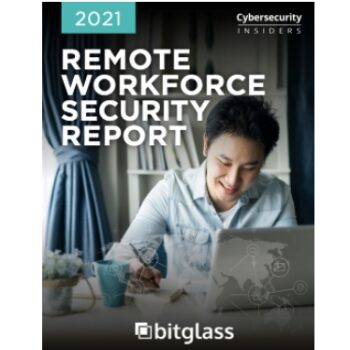
Remote work: Security concerns remain. Bitglass report sees increased use of cloud technologies through permanent home office models.
Cloud security provider Bitglass has published this year's Remote Workforce Security Report. In a survey, IT and security professionals provided information about the effects that working from home had on data security in the past year.
Home office is establishing itself - despite security concerns
In the majority of companies (57 percent) three quarters of the employees are still working from home after one year. An overwhelming majority of companies, namely 90 percent, stated that they wanted to keep this high proportion of home offices in the future due to the higher productivity. In addition, 53 percent of companies plan to move certain positions permanently to the home office after the end of the Covid crisis - a significant increase compared to the beginning of the pandemic, where it was 33 percent.
Even after a year of experience working from home, many companies are still concerned and inadequately equipped to ensure data security among the workforce outside of their own business premises. The companies see the greatest dangers in data leaks at endpoints (68 percent), users who connect to unmanaged devices (59 percent) and access from outside the network perimeter (56 percent). These concerns are followed by regulatory compliance (45 percent), remote access to core business applications (42 percent), and loss of visibility into user activity (42 percent).
Cloud security: further strategic investments needed
For working remotely in the home office, the security officers are increasingly relying on a cloud-based IT ecosystem: 71 percent of them state that their company will switch from on-premises applications and tools to the cloud for home office purposes.
Despite a multitude of measures to secure home office work, most companies are still struggling with the challenges caused by tools that are outdated for the requirements: bandwidth restrictions, which have a massive impact on the scalability of security solutions, were, for example, from 41 Percent of respondents named as the main obstacle to data security in the home office. The fact that the majority of companies (55 percent) stated that they had difficulties using VPN in the past year can be attributed to this, among other things.
More flexible IT ecosystems via the cloud
"A modern work organization needs more flexible IT ecosystems and relies more on the cloud and cloud security tools," says Bitglass CTO Anurag Kahol. “After COVID-19, we will need a mixed IT and security environment because the employees work both at work and in the home office. The use of cloud technology is crucial for this, and the switch should not be delayed too long. "
Straight to the report at Bitglass.com
About Bitglass Bitglass is a global provider of a NextGen CASB solution based in Silicon Valley. The company's cloud security solutions offer agentless zero-day, data and threat protection everywhere, for every application and every device. Bitglass is funded by senior investors and was founded in 2013 by a group of industry veterans who have introduced and implemented numerous innovations in the past.
